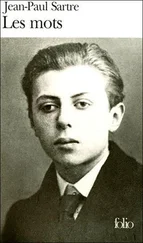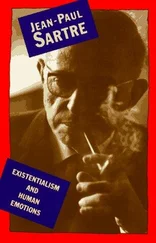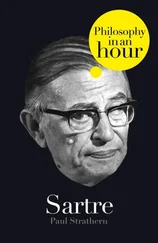The truth is that despite its existential theme, Suhail Idris’s novel in no way matches the nihilistic and profane life of the philosopher of al-Sadriya in the sixties. The writings of Abd Allah Abd al-Dayim and René Habashi published in al-Adab journal in the early fifties lacked a deep existential vision that could refute the philosopher’s vision or even equal it. This is true of Professor Albert Nasri Nader’s lecture at the College of Humanities and Emile Shuwairi’s translations. In any case, the philosopher had strong reservations about those translations and doubted the correctness of Shuwairy’s interpretation of the original text. What could those two scholars add for someone who was able to read Sartre in the original language?!
By pure coincidence, in a Paris bookstore Abd al-Rahman had found a biography of Sartre the same year he left Baghdad to study for his doctorate. That book was full of photographs of Sartre, members of his immediate and extended families, and some of his friends, and also included a number of childhood photographs. It was in this photograph album that the Iraqi philosopher discovered the close resemblance between himself and the French philosopher: the hairstyle that Sartre never changed and the facial features, except for his glasses and crossed eyes. While he managed to duplicate the black plastic eyeglass frames with thick lenses, he had no way of simulating the crossed eyes. That failure remained a source of aggravation for the philosopher that lasted his whole life. Strangely enough, Sartre’s father looked like Shawkat Amin, Abd al-Rahman’s father, except for the headgear, the stick, and the coat. The philosopher’s mother, Munira al-Hafez, resembled Sartre’s mother as well, and even the philosopher’s maternal uncle could have passed as Sartre’s uncle’s twin brother.
These discoveries moved the philosopher deeply. Back in his Paris apartment he was overcome by vertigo and fell out of his chair. He suddenly knew that he was destined to be a philosopher and realized that he belonged to a family of philosophers. As such, he was made for thinking, not working, and it fell to him to take those ideas back to his homeland.
His epiphany led him to surrender completely to the precepts of existential philosophy and to vow total allegiance to the philosopher’s life. These feelings were compatible with his conceptions of his childhood and adolescence, in which he saw his parents as two great and mighty gods — handsome, heroic, pure, and wealthy — who looked after him and shielded him from his weaknesses and narcissism and saw to it that he grew up strong and able to confront the external threats of society. But as soon as their vigilance weakened, he became aware that his parents were not all he had imagined them to be and that there were other gods more beautiful, more powerful, and wealthier. It was as if he had fallen from the heights and discovered that familial love was a huge deception. At this early stage of confusion he only found solace in his thoughts or, worse, emptiness. His reaction was to invent a legend in which he was a child rescued and adopted by an unknown family nobler and purer than the parents who raised him. He held the woman who tucked him into bed in the cold winter nights to be his adopted mother; likewise with the man who acted as his father. He thought of himself as an illegitimate child.
This make believe opened up a dream world filled with strange stories that inclined him toward greater secrecy about his private life. He turned into an unmanageable child who got his way by shouting and lying. He became insatiable in every enterprise he undertook and in the sensual pleasures he sought. The changes all took place after he discovered the true nature of his parents’ relationship when spying on them through their bedroom as they made love. It was mainly his father’s role in his life that remained problematic for him and which had led to bouts of nausea since childhood. Thus, existentialism for the philosopher was not the result of formal education but rather had been deeply ingrained in him from his very beginnings — it was a pure existentialism, realized in the minute details of his private life.
37
Abd al-Rahman hated his mother mercilessly. His hatred was evident in his passion for the forbidden and his propensity for violence and rage. His mother had been a model of gentleness, and she was closest to his heart, almost a miraculous creature in his eyes. But her quiet, affectionate nature was stripped away by her son’s violence and his inclination to hurt himself and thus torture her. He wanted to face her as a suffering child. In his dreams his mother would torture him to get him to confess that he had been spying on her in her bedroom. She would cut off his head, shave it bald, and cast it away from atop a cliff.
His indiscretion was unknown except to the few servants who pulled him out of the mud into which he had fallen after leaving the house one rainy night. His hatred for his mother and father festered from that day on. He didn’t want to feel that he was the offspring of a sinful union, thickly encrusted in blood, because it is foul and disgusting. In his eyes, his mother and father lying in bed together was tantamount to true adultery. Whenever he traveled with his father by carriage through the Jewish quarter of Baghdad he would be overpowered by the feeling that his father had brought him there in order to throw him to the bloodsuckers in this dirty ghetto, where thousands of Jews lived in narrow, winding streets. The putrid smell of decay, blood, and offal rose from the ditches. The odor was just like that of their lovemaking, the same smell he had noticed through the door, opened just a crack, to his parents’ bedroom.
38
It all happened on a cold rainy evening when his mother carried him to his bed, covered him with sheets and blankets, and told him the story of the lizards that roam the halls of the house at night. She was trying to lull him to sleep, promising to give him things he liked, but he soon realized that his mother was preoccupied by other matters and was in a hurry to bid him goodnight. He saw a twinkle in her eye and a twitch in her face as she fibbed to him. He pretended to fall asleep, and as soon as his mother was reassured, she rushed to her room. He got out of bed and went to his parents’ bedroom.
When he peered into their room he saw his mother’s naked body move on the bed and his father squeezing her breasts in his hands. They were feverishly engaged in lovemaking, and the sight was nauseating to him. He couldn’t believe what he was seeing. As she moaned with pleasure, his mother’s voice sounded repugnant to him. He covered his ears.
He rushed down the stairs, threw open the main door, and ran into the garden shouting hysterically. He was haunted by the image of his mother, her face drained of innocence. She was fading away like a squeezed pimple. She was a devil chasing him. He slipped and fell and lay in the mud, where the servants later found him and carried him home on their shoulders, water and mud dripping from his clothes.
In the morning all three ate breakfast together, but his mother avoided his eyes and did not talk to him, in an effort to ignore the events of the previous night. When his father went to parliament, his mother stayed in the living room to enjoy the morning sun, but Abd al-Rahman ignored her and avoided talking to her. The tension lasted a whole week.
The boy was withering away, and his nausea persisted, especially when he remembered the horrible sight he had witnessed that night. His mother, Munira al-Hafez, would go down to the living room where he was sitting on the couch near the window staring at the thick trees in the garden. As soon as she got close to him, with her blond hair pulled up, fair skin, pure white face, beautiful neck, and colored winter clothes, he would rush away to his room.
Читать дальше












